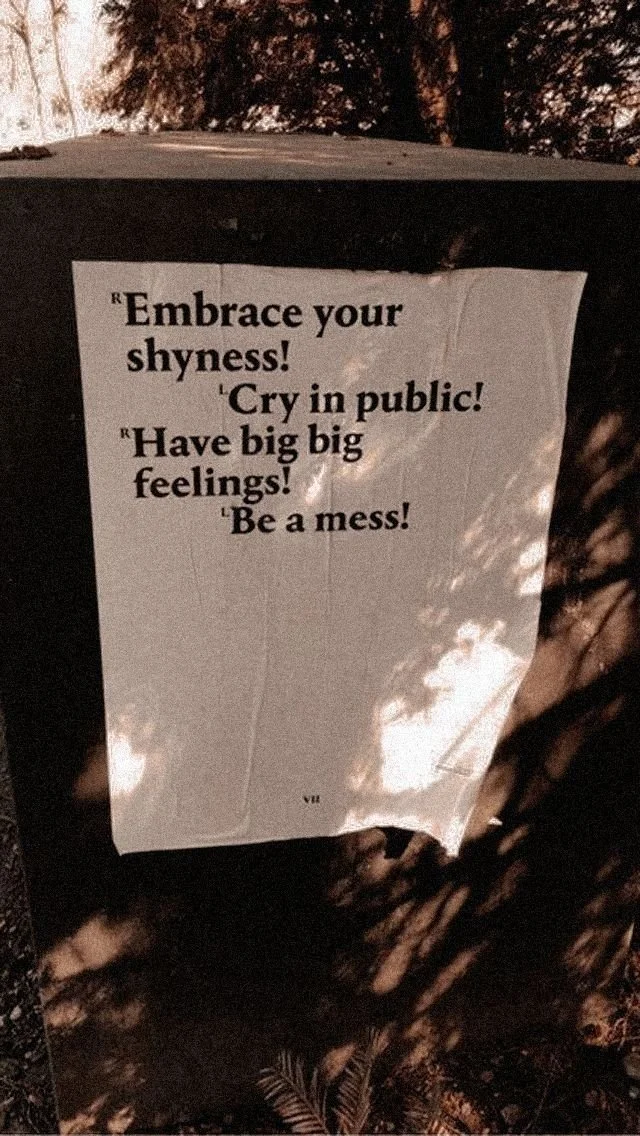Make Crying Great Again
This post is about the millions of people who utter the words "Sorry" the moment they start to cry.
I’ve been convinced for long while that we’re in need of an environment that embraces the full spectrum of our humanity to a much larger extent. One step in that direction, for instance, could be working to eliminate the shame that’s associated with crying.
Here’s what I’m referencing. Tears can easily well up in our eyes, in the eyes of a client or a close friend, and equally in the eyes of a stranger appearing in the media, when the content is overwhelmingly emotional. I doubt any of us question the timing of tears - we get it.
So, I think we’ve all witnessed these scenarios - someone telling a sad story, perhaps the most painful in the world for them, either in person or we see it in the media. Or someone navigating a difficult professional situation which can inevitably trigger all kinds of big feelings. You watch them trying to hold it together so they can continue to communicate. Inevitably they get choked up, and their voice starts to quiver as the tears well up. By this point, you're 100% invested in their story or situation when you hear the inevitable: "I'm sorry."
(Disclaimer, I'm referring specifically to North American culture, and I'm not worldly or lingual enough to know where else this happens.)
Why the apology? What is the subtext? "I’m sorry I could not provide you with a more fluid listening experience as I express to you this life-changing trauma of mine.”(?) I’m sorry you feel slightly uncomfortable? I’m sorry I get emotional when emotions are involved? I’m sorry I haven’t mastered the art of masking my feelings?
Granted, it's likely a multi-layered mechanism at work. One unintended purpose it does serve well is to push the pause button for a few seconds, which may be necessary. Secondly, most of us do feel uncomfortable imposing on one another, and knowing others may feel uncomfortable witnessing our strong emotions is the other tricky side of sharing.
So, please, storytellers: pause, breathe, take a moment to gather yourselves if that’s what you need. We’re listening, and we understand. We know what sadness looks and feels like. Furthermore, we’ve shown up here intentionally. Not holding it together is exactly what you should be doing right now. And If the person across from you is second-hand struggling, well, that’s okay.
I’m hoping readers agree that it’s time to change the status quo on this practice. Here’s my suggestion for now: I urge editors of everything filmed from this point on to start paying attention. So, for example, where a person shares their story about trauma of any kind, let’s start to edit out the parts where human beings feel obliged to say “sorry” for getting choked up.
Let’s see if we can set a new precedent that doesn’t promote that reflexive legacy of apologizing for being human in the good ways. There are plenty of other human characteristics and feelings we involuntarily carry that can evoke shame more understandably. (Like when we want our kid to disappear and leave us the heck alone, and, yes - to stop crying already, or we want to murder our in-laws.)
Can we start a movement that champions being openly and unapologetically sad when you’re sad? Even when you’re speaking in a public forum? Can we help the next generation feel naturally comfortable about being vulnerable human beings (since that’s what every single one of us is anyway)?
To this end, let’s start at home in a very intentional way. When our child cries, perhaps at a time when a situation becomes overpowering, let’s see how our response shows that we’re focused on catching them right where they are - at their sadness/anger boiling point. And giving it the legitimacy it must deserve. Even if we feel deep down that their feelings are not proportional to the reality. As adults, we’ve developed a broadened perspective on what seems to “matter.” But I know I would cry a whole lot if someone else were in control of when I could and could not eat ice cream. Especially if I had no idea there was an end in sight to that reality. Control over one’s life, for example, matters.
We keep on learning that lesson over and over, even as adults, as we struggle with the world around us, with our own society, and with our respective governments.
Crying is a symptom of momentary strong feelings that need to find release. That’s a good thing.
Encouraging expressing real feelings in real time seems like a worthy goal with fairly obvious benefits.
Let’s make crying great again ;)
